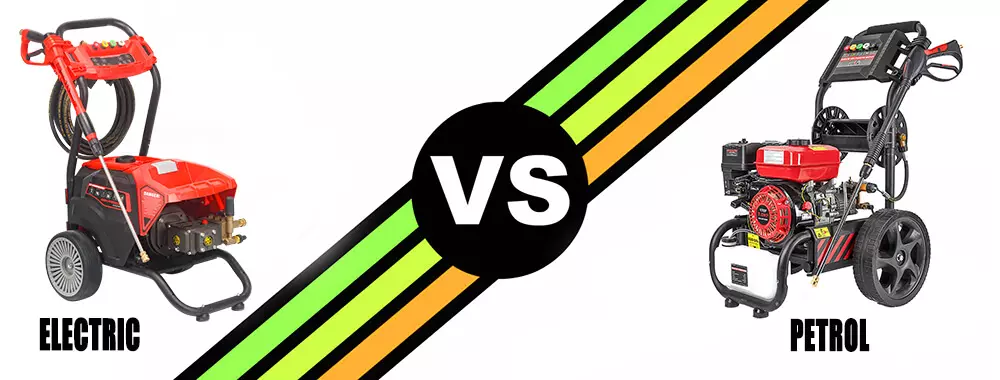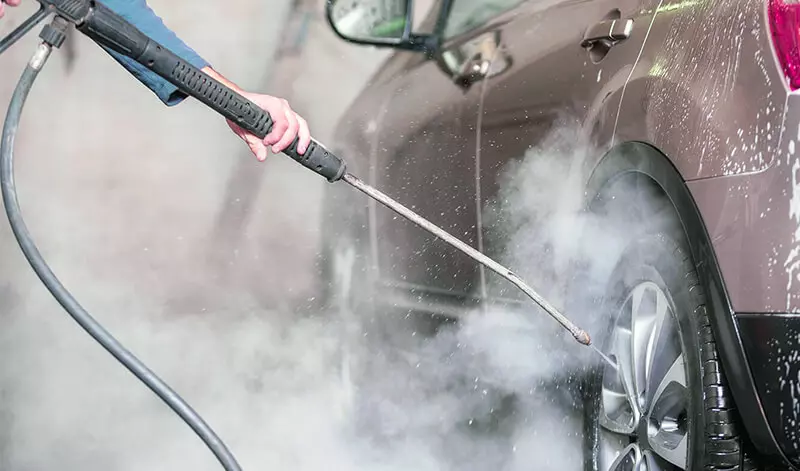27Dec 2023
table of contents

High pressure washer, commonly known as high pressure cleaner. Exceptionally effective cleaning devices utilize the force of a high-velocity stream of water to eliminate obstinate various surfaces. finding widespread application in cleaning structures, automobiles, concrete surfaces, outdoor furniture, and more. Have become essential instruments in both residential and commercial settings.
In current pressure washer market, there are two main types that sell best: electric and petrol pressure washers. Each type has its advantages, leaving many potential users confused when choosing.
However, with this detailed analysis of electric pressure washers and petrol pressure washers, you will come to grips with their pros and cons, key differences, and essential considerations, and then start choosing the pressure washer that best suits your needs, will become very simple. Follow BISON to learn which type of pressure washer will be your best friend in the fight against grime!
Due to their effectiveness, ease of use, and portability, electric pressure washer have established a distinct niche as dependable cleaning tools suitable for both residential and light commercial applications.
The straightforward plug-and-play functionality stands out as a key benefit of electric pressure washers. Unlike their petrol counterparts, there's no hassle of dealing with fuel, making them notably simpler to use.
Electric motor pressure washers do not require oil changes or regular refills.
Generally speaking, most power washing machine models are lightweight, compact, and easy to move and store.
The electric high-pressure cleaner operates with zero emissions and is very consistent with environmental protection requirements. They also tend to be quieter than petrol models, which is extremely important in residential areas or places with noise restrictions.
Compared to their petrol counterparts, electric pressure washers frequently come with a more affordable initial price, presenting an appealing choice for consumers mindful of their budget.
Electric pressure washers typically produce lower PSI, so they are not able to handle demanding cleaning tasks, or expansive areas, such as stubborn stains on driveways or exteriors of sizable buildings.
The operating range of an electric pressure washer is limited to the length of the cord and the distance from the electrical outlet.
Some electric models may not provide sustained high performance over time and have a shorter service life, especially lower-end models.
Electric pressure washers excel at residential cleaning tasks. They are the first choice for cleaning patios, decks, outdoor furniture, vehicles and small garden paths.

Petrol pressure washers are particularly popular in commercial settings and demanding residential tasks as the choice of rugged, powerful cleaning equipment. Due to its high-voltage output and cordless operation, it is often used for larger, tougher cleaning jobs.
A notable advantage of petrol pressure washers lies in their higher PSI (pounds per square inch), providing the necessary power to effectively combat tough stains and handle heavy-duty cleaning tasks with greater force.
Petrol pressure washers are not connected to a power cord and offer a lot of freedom of movement.
Generally speaking, petrol models ensure consistent performance standards, which some electric pressure washers can sometimes lack.
Petrol pressure washers are generally very durable. If properly maintained, the industrial-strength components and rugged design provide a longer life than some electric pressure washers.
One obvious disadvantage of petrol pressure washers is their operational complexity. They require fuel to run and require more maintenance, such as oil changes and regular engine inspections.
petrol engines are significantly noisier when running compared to electric pressure washers. Noise may cause inconvenience in residential settings or noise restricted areas.
Petrol pressure washers emit exhaust fumes during operation, diminishing their environmental friendliness.
Furthermore, the elevated initial acquisition costs of petrol pressure washers, combined with ongoing expenditures linked to fuel and more frequent maintenance, can substantially increase the overall cost of ownership and operation. This cost factor makes electric pressure washers a more cost-effective alternative for a considerable number of users.
Petrol pressure washers truly shine in their ability to excel in large-scale and heavy-duty cleaning tasks. This includes effectively tackling deep cleaning jobs for building exteriors, driveways, agricultural equipment, and various commercial facilities. The unrestricted operating area makes it an excellent tool for landscapers and property managers, as well as working in the construction, agricultural and industrial sectors.

The following table details the differences between the two in many aspects.
Electric Pressure Washers | Petrol Pressure Washers |
Lower PSI that is suitable for lightly soiled surfaces, easier for beginners to use due to less power output. | Higher PSI that can tackle more stubborn dirt and stains, which might be harder for novices to control due to high power output. |
Essentially plug-and-play, requiring fewer steps to start using. | Requires setup and maintenance, which might be complex for inexperienced users. |
Needs minimal maintenance, making them more user-friendly. | Requires regular upkeep including engine checks and fuel top-ups. |
Compact and lightweight, easier to carry and maneuver around. | More substantial and heavier, which might limit quick movement and storage. |
Environmentally friendly due to zero emissions, plus quieter operation. | Produces exhaust gases and typically runs louder, which could affect both local and broader environments. |
Generally less expensive, both in upfront costs and maintenance. | Tends to cost more initially, with ongoing fuel and maintenance costs. |
Operational range limited by the length of the power cord. | Offers greater mobility due to absence of cords. |
Geared more towards residential purposes and smaller cleaning tasks. | Usually chosen for commercial uses and tougher, larger-scale cleaning tasks. |
Selecting the optimal pressure washer requires a thorough consideration of various factors. Careful evaluation is essential to ensure that you choose between an electric or petrol pressure washer that aligns with your specific needs. In this section, BISON walks you through these key considerations.
Understanding your needs is paramount:It's crucial to identify the specific cleaning tasks your pressure washer will be handling. Whether it's a small patio or a large driveway or building exterior, knowing the scale and nature of your cleaning requirements is essential. Additionally, considering the types of dirt or stains you commonly encounter will further inform your decision-making process.
Power Requirements: The pressure level (PSI) you need depends largely on the intensity of cleaning you need. For lighter cleaning tasks like patio furniture or vehicles, a lower PSI may suffice. However, when dealing with deep-rooted dirt, peeling paint, or extensive outdoor areas, opting for a petrol pressure washer with a higher PSI becomes more beneficial. Pressure levels matched to specific cleaning requirements ensure optimal performance.
Water Flow: typically quantified in gallons per minute (GPM), is of equivalent significance. A higher GPM implies that the pressure washer can cleanse a larger surface area, thereby enhancing its productivity.
Budget: Your budget will significantly impact your decision. Though electric pressure washers may seem more economical upfront, it's crucial to consider longevity and performance. From that perspective, petrol pressure washers may offer better value over time. Remember to consider the ongoing costs of consumables and maintenance.
Portability: Consider where you will perform the majority of your cleaning tasks. If you need to move your pressure washer frequently or clean multiple locations, a lighter, more compact model will be beneficial.
Environmental Impact: Environmental considerations are another key point. If reducing emissions and noise is important to you, then an electric pressure washer will be more suitable.
Other Notes: the availability of accessories and spare parts becomes a significant factor. Electric pressure washers, generally viewed as consumer-grade devices, typically have a broad array of accessories and spare parts readily available on the market. On the other hand, gas pressure washers, frequently viewed as more industrial-grade equipment, may have higher-priced replacement parts and may necessitate specialized tools for maintenance or repairs.
Having understood the differences and critical factors, it's time to decide: will it be an electric or a petrol one?
Electric pressure washers are easy to operate, low maintenance and produce low emissions, making them ideal for light stain removal, daily cleaning tasks or where noise is a concern. At the same time, petrol pressure washers stand out for their undisputed power and mobility. Although they are more complex to operate and maintain, they offer flexibility that electric pressure washers cannot match. Heavy-duty tasks, tough stains, large areas – it’s all possible with the high PSI and cordless operation of the petrol cleaner.
Choose appropriately based on the characteristics and potential limitations of each type, carefully considering your specific requirements such as intended use, budget, etc. In the meantime, when you're considering making a decision, consider a reliable supplier with a solid reputation for quality and quality. Serve. BISON, as a reputable brand in the pressure washer industry, offers a range of models, including electric and petrol options. With an unwavering commitment to quality and customer satisfaction, investing in BISON pressure washers will go far beyond your expectations.
Armed with this knowledge, take the next stride and visit BISON supplier to discover the ideal pressure washer tailored precisely to meet your needs. Happy cleaning!
inquiry form here
BISON BLOG, All the latest news and views from Bison Machinery.
Related Articles
electric vs petrol pressure washer: which is betterRelated Products